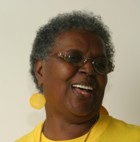Goldie (“Ms. Goldie”) Henton – Liver Transplant Recipient
 “I owe it all to God, my family, my donor and my donor’s family.”
“I owe it all to God, my family, my donor and my donor’s family.”
If you ask Louisville’s Goldie Henton or “Ms. Goldie” as she is known to many, who she has to thank for her second chance at life she will tell you straight away, “I owe it all to God, my family, my donor and my donor’s family.”
Prior to her retirement from Phillip Morris in 1998 Goldie went for a routine check-up. The doctor did some blood work and the liver tests showed that there was something wrong with her liver.
“I was diagnosed in 1997 with cirrhosis of the liver. I didn’t know what cirrhosis was or what was going to happen to me until they told me and my family that I’d need a liver transplant right away. Up until then I was a happy go lucky person and involved in all sorts of things.”
Goldie and her husband were members of the Golden Hawks Motorcycle Club and traveled all over the United States. She was very active in her church as well as with Phillip Morris’s charitable works.
Goldie eventually retired from Phillip Morris because of her health. She was on a lot of medication and she was getting sicker as she waited for a transplant. “The transplant hospital gave me a beeper so I would know if a transplant became available. I had that beeper with me everywhere I went.”
As time went on Goldie was getting weaker and weaker. She went from 175 pounds to just 90 pounds. “The medical community was starting to give up on me but my family just wasn’t going to have it so they took care of me,” she said.
Goldie has a large, supportive family all over the country but it was her family in Kentucky, especially her nieces Joyce and Clarissa that took care of her. Different family members would take her shopping, to church and feed her when she couldn’t get out.
Eventually, Goldie had to be admitted to the hospital for a blood transfusion and the doctor told her family to get her affairs in order. However, Goldie was not going to have any of it. “God gave me the strength to pull myself together. A lot of prayers went up to the Lord. When I came home from the hospital for the weekend I honestly didn’t think I would make it.”
Three days later Goldie’s beeper went off. “I have this saying about God’s plan, He may not come when you want Him but He’s always right on time.”
Clarissa came over and got Goldie in the car, drove to the hospital and called the rest of the family on her cell phone. When they arrived at the hospital Goldie was put on a stretcher and she was signing papers as they wheeled her into surgery.
Goldie was in the hospital for two months afterwards because she was so weak before she went into surgery. She had a lot of physical rehabilitation and she was known to the staff as the “music lady” since she brought a tape player with gospel music with her to her treatment sessions.
The only part of the process that Goldie feels sad about is her donor and her donor’s family. After writing to the donor’s family several times through the anonymous letter writing program sponsored by Kentucky Organ Donor Affiliates (KODA), her donor’s father wrote back. He came from Hardin County to Louisville to meet Ms. Goldie at a KODA event.
“I learned my donor was 17 when he died. He was in a freak accident and hit his head. His father told me it was his son’s request to be a donor. Kids today are just more receptive to organ donation and signing the back of their licenses than older folk.”
Goldie still keeps in touch with her donor’s family. They write to each other several times a year and exchange Christmas and birthday cards. Goldie sent her donor’s father a picture of her with her 4 grandchildren. “If it wasn’t for my transplant I wouldn’t have met 3 of them.”
Since her transplant Goldie has stayed active and continues to volunteer. Mostly Goldie tries to educate people so they know the truth about organ donation. She understands that people have the wrong idea about organ donation because she didn’t know much about it before her transplant either.
“It’s the ignorance of what we don’t know that has to be said to everybody. All you have to do is take time to listen.”
For those people who have a fear that doctors will not try to save their lives if they are an organ donor Goldie tells them about her nephew who as in a coma for 3 months and by the grace of God survived. Today he is a deacon in the church.
“We were in the hospital for 3 months with that child and no one tried to talk to us about being an organ donor. They only tried to save his life. You can’t be a donor unless you’re brain dead and that’s different from being in a coma.”
For those people who believe they came into this world with their organs and they are leaving the same way they came in, Goldie helps them understand what good can be done after they are gone.
“You have to talk to them and let them know their organs are not going to help them in heaven. Heaven knows we need them here. You can save people’s lives by donating your organs. Imagine if someone could say to your family that you helped save their daughter’s life or helped a blind person see or made it possible for a kidney patient to get off of dialysis.”




